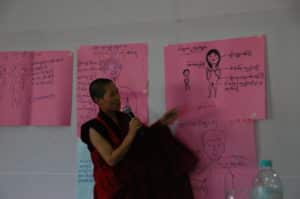
“Why do nuns need reproductive and sexual health education? This was the first question Dr Tashi Zangmo was asked in 2011 when she started the life-skills based sexuality education programme for Buddhist nuns in Bhutan. Difficult as it may have been, the founder of the Bhutan Nuns Foundation (BNF) did not let such prickly queries deter her. Thanks to her single-minded determination and support from other partners, about 1000 Buddhist nuns from the country’s 28 nunneries have not only learned more about their own bodies, but are now sharing reproductive and sexual health information with the community.
This is a major achievement for the world’s only Buddhist country where monastic life is important and cultural sensitivities and community beliefs about issues related to sexual and reproductive health are the biggest barriers to accessing sexual reproductive health information and services, especially for nuns.
One of the important outcomes of this innovative intervention with religious leaders has been the involvement of men. Since most of the nunneries are headed by male teacher or monks, participation of their nunneries in this training has led to engaging men on these sensitive issues for the first time.
But it wasn’t easy. Six years ago, when the Bhutan Nuns Foundation (BNF), a Thimpu-based not-for-profit organisation, first launched the program with the support of UNFPA in Bhutan, it was hard to convince heads of nunneries. A majority of the 28 nunneries in Bhutan are headed by monks or male teachers. “Initially we faced opposition. We knew it would take time and patience to break the silence around women’s reproductive health issues in the nunneries. We knew that once trained, nuns would become agents for change not only through traditional rituals and prayers but also as advisors on health issues because traditionally, the first thing Bhutanese do when they get sick is to seek the help of a religious person,” says Dr Zangmo, founder and executive director, BNF.
Once carrying out a needs assessment in nunneries, BNF collaborated with Bhutan’s Ministry of Health and Ministry of Education to develop a curriculum for the life skills education (LSE) with support from UNFPA. During the dissemination workshops, nuns were given information about women’s reproductive health and hygiene, communicable and non-communicable diseases, HIV/ AIDS, substance abuse, domestic violence, teenage pregnancy, menstrual hygiene, and cervical and breast cancer.
Although health experts were brought on board to conduct trainings, Dr Zangmo was quick to realize that since some were men, nuns would find it hard to discuss these sensitive issues. If one of their facilitators were also a nun, however, it would make the process more interactive and inclusive. So Ani Namgyel Lhamo., BNF’s assistant program officer and the only ordained nun working in the organization was trained first. This proved to be an effective strategy as Lhamo was a quick learner and became an integral part of all trainings. She is now one of the five nuns who received certification as a ‘Trainer of Trainers.’
“Being a nun, I know the problems they go through. Many nuns are uneducated and have no scientific knowledge about their bodies. They are very shy when photographs are shown about the reproductive cycle and menstruation. They believe in myths that have been perpetuated by others. So when these nuns between the ages 12-30 hear me talking about issues like menstrual hygiene, they can relate to it. They also listen when I break these myths,” says the 34-year-old LHamo.
Still, BNF understood that it wasn’t enough to just talk about health and hygiene when many of the nunneries, especially in remote rural areas, did not have proper toilets or shower rooms. “How could we expect them to maintain hygiene when they didn’t have basic facilities? So, we raised funds to help nunneries get running water, and build toilets and shower rooms. Besides, teaming up with UNICEF Bhutan to conduct workshops on menstrual hygiene management, we are providing nuns with sewing machines so that they can make their own reusable, cost effective and environment friendly sanitary napkins,” states Dr Zangmo.
The intervention, which was shared at the recently concluded Asia Pacific Conference on Reproductive and Sexual Health and Rights in Vietnam, is likely to be adapted by some nunneries in countries like India, among others. “This novel initiative has brought nuns and monks together to discuss issues like puberty and contraception. Investing in nuns to be agents of social change has broken many barriers,” says Karma Tshering, national program officer, UNFPA Bhutan.


